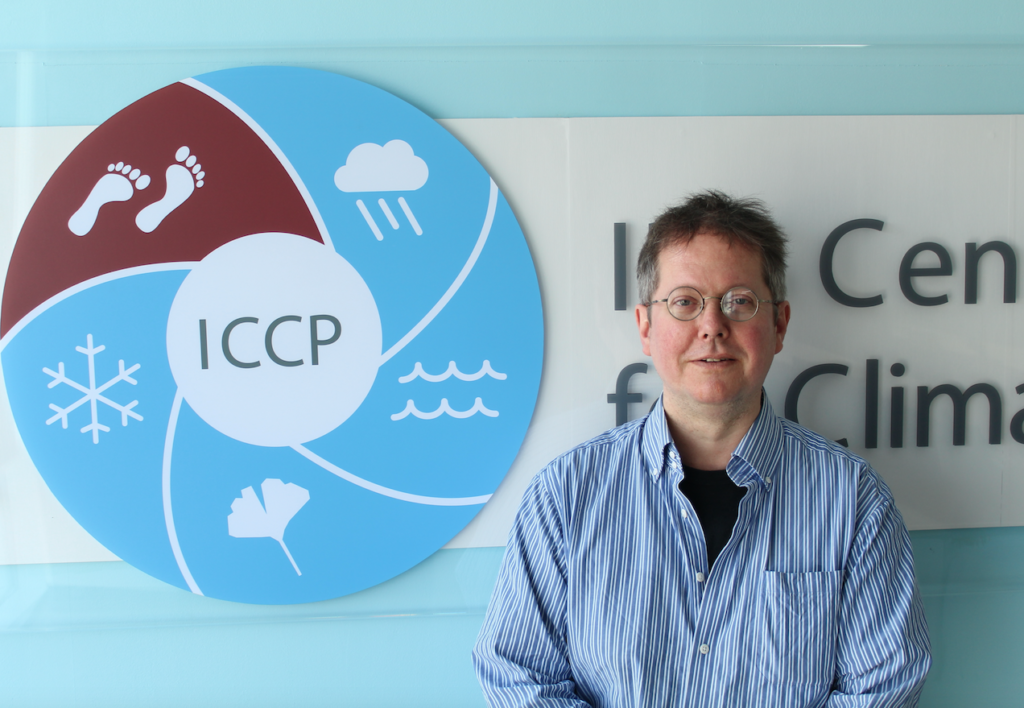
Keith Rodgers is a Senior Research Fellow at the IBS Center for Climate Physics (ICCP). After an education in Physics from the Reed College, Keith got his M.S. in Engineering Mechanics and Ph. D. in Oceanography from the Columbia University in the United States. He worked as a research scientist in the Program in Atmospheric and Oceanic Science (AOS)
Q. What is your main research area and how did you get into the field of climate research?
My main research area is the Earth’s carbon cycle, in particular the ocean carbon cycle and its link to the broader climate system. This interest first developed during my undergraduate studies in physics in a small liberal arts college, but at the time I did not have a chance to pursue coursework in anything climate-related. It was in graduate school that I developed my keen interest in the field of oceanography.
Q. What motivated your desire to come to the ICCP in Korea for your next career stage?
After learning about the existence of the ICCP, I was interested in the possibility of participating in the scientific development of this new institute focused on climate modeling. I have known Axel Timmermann, the director of ICCP, since 1998 when I was a postdoc in Hamburg Germany and was very excited to learn two years ago that that he was intent on building this new institute from scratch.
Q. What do you think the role of climate scientists is in our society?
This is a very important question on which there are a large number of divergent opinions amongst scientists themselves. Is conducting our science to the best of our abilities enough, expressing this is peer-reviewed publications, or should we be engaged in outreach through schools and media and other means to communicate the understanding reached by our own research and the field? I personally think that it is imperative that scientists be engaged in public communication beyond their individual research efforts given the challenges that the Earth faces. It is of course important that some of this occurs through efforts such as those sanctioned by the United Nations (such as the IPCC*), and it is also of value to consider societal de-carbonization and sustainability strategies that may not arise naturally from a neoliberal economic framework of perpetual growth.
*IPCC: Intergovernmental Panel on Climate Change
Q. When in your career did you feel most confident and proud of yourself?
Climate research, in particular research with climate models, is often a big collaborative effort. This is reflected by the rarity of single-author publications in this field. In hindsight professional experiences have been especially interesting in moments where preconceived ideas have turned out to be wrong. What I mean here is that a strong feeling of accomplishment can result from choosing projects with a degree of risk, and not worrying too much about being wrong and learning from that experience.
My most rewarding efforts to date have really come through collaborative efforts, as well as through the mentoring of early career (PhD students and postdocs) scientists. It has in fact been through the integration of bright early career scientists into broader collaborative efforts that the injection of new ideas has led to the most fruitful results. That being said, I have had particularly rewarding experiences over the last five years with exploring large ensemble approaches to estimating uncertainty in future climate projections. This work has also inadvertently led me into the realm of “big data”, where the hope is that prior training can help to identify important signals in what would be an overwhelming stream of information. In that way climate research can upend the classical scientific idea of building a hypothesis and testing it experimentally as being the singular core activity of research. As often as not serendipity is at play, as there are untold surprises to be found in nonlinear systems such as the Earth’s climate system.
Q. You have been working with many international scientists at the ICCP. What do you think of the research environment in Korea?
The research environment here is very friendly. The senior researcher staff here at the ICCP all have a strong degree of research independence, yet bring to the institute a strong valuation of collaborative project-building. I don’t have much exposure to the university research system in Korea, but to me the system here is in many ways more like the Max Planck Institute system in Germany than American university departments in that sense.
Q. What advice do you have for students who are interested in getting into climate research?
To the extent possible it’s greatly beneficial for undergraduates to take the initiative to reach out to researchers to create a research project, as a complement to the learning that occurs in classrooms. Nearly all researchers are more than happy to work with motivated students. Both parties learn from project-building.
Q. What is your future research plan?
Looking forward, I am especially interested in understanding how the physical components of the climate system and the marine carbon cycle “couple” over a range of timescales. I am also interested in learning how marine ecosystems are impacted by climate change. Even with sophisticated Earth system models that include many of these components it can be extraordinarily difficult to identify mechanistic pathways. To solve these problems we will need to learn to work with a hierarchy of models (simple to complex) to develop and test our ideas, and the state-of-the-art modeling tools at the ICCP provide a unique resource for moving forward.